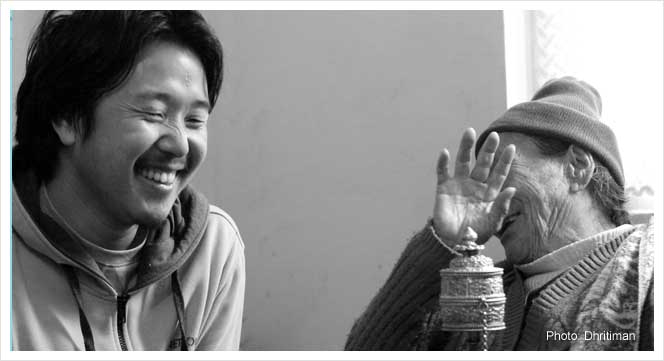No Withdrawal Symptoms

Gyatso Lepcha, part of the Affected Citzens of Teesta anti- dam movement, with his grandmother, who will soon hit a hundred.
We have this friend who lives in a sprawling 100 year old house surrounded by an overgrown garden on top of a hill near Perdeniya in Sri Lanka. We visit whenever we can, spending a week or two reading, talking a little and sleeping a lot.
Last summer, we spent a month in a little village near Chamba in Himachal. We sometimes took the bus into town but mostly wandered about the steep terraced fields leading down to the river and chatted with our neighbours.
Just a fortnight ago we were in the Lepcha area of North Sikkim, staying in the village home of a young couple with 2 delightful little children.
So what do my travel accounts have to do with media? Nothing…and everything.
Unless one goes to a great deal of trouble, which nobody does, one doesn’t get the newspaper in any of these places. TV, yes, in a limited sort of way, but except for the few serial addicts, no one seems terribly interested. The young people have earphones glued on permanently, though, and the body language of mobile phone addiction peeps through sometimes. The point is that mass media is not consumed as part of the staple daily diet, the way it is in cities.
Two things struck me while hibernating in these places. One is that I did not miss the mass media. There were no withdrawal symptoms. That probably means that these media haven’t, as yet, become a drug I can’t do without even though, as an urban being, I consume them regularly. Something to be thankful for, I’m sure.
The second, more important, thing is that the absence of mass media has channelled the flow of information, communications and opinions in a different direction and has probably even made the process richer. Personal stories, community experiences, festivals, all age- old media, have assumed a new relevance. How the farming community and the small Buddhist monasteries cope in an ever modernising Sri Lanka, what ordinary people feel about the ethnic conflict- these are stories the national dailies do not carry. How nomadic sheep herders still form the backbone of Himachal’s economy isn’t a story you will find in the tourist brochures. And the determined anti- dam struggle of the Lepcha community gets lost in the ‘bigger’ issues the national media scream about every day.
Is there a lesson in all this? Should we perhaps question the value of our immersion in mass media and our exposure to a constant barrage of information (and misinformation)? How much is relevant, dependable, actionable? Are we really the well- informed, up- to- date citizens we claim to be? How much of our despair at the ‘state of affairs’ stems from bad news that we subject ourselves to but are powerless to do anything about?
Is it time to listen more closely to the voices nearer home, to ‘news’ that we can reflect upon and perhaps act upon?



This has been a topic of intriguing discussion with many of my friends. Should we consciously boycott the havoc of mass media and concentrate more on our instincts? Listen more to people around and not to breaking news on channels? Mass media has an alarming capability of consuming the consumers and I strongly feel that there is a constant need of filtering daily news flow. Sometimes just shut things and talk to people who can share more important and rational news than these politically or economically biased news created by the houses of media-barons per. Thank you for reminding the need of the hour again.